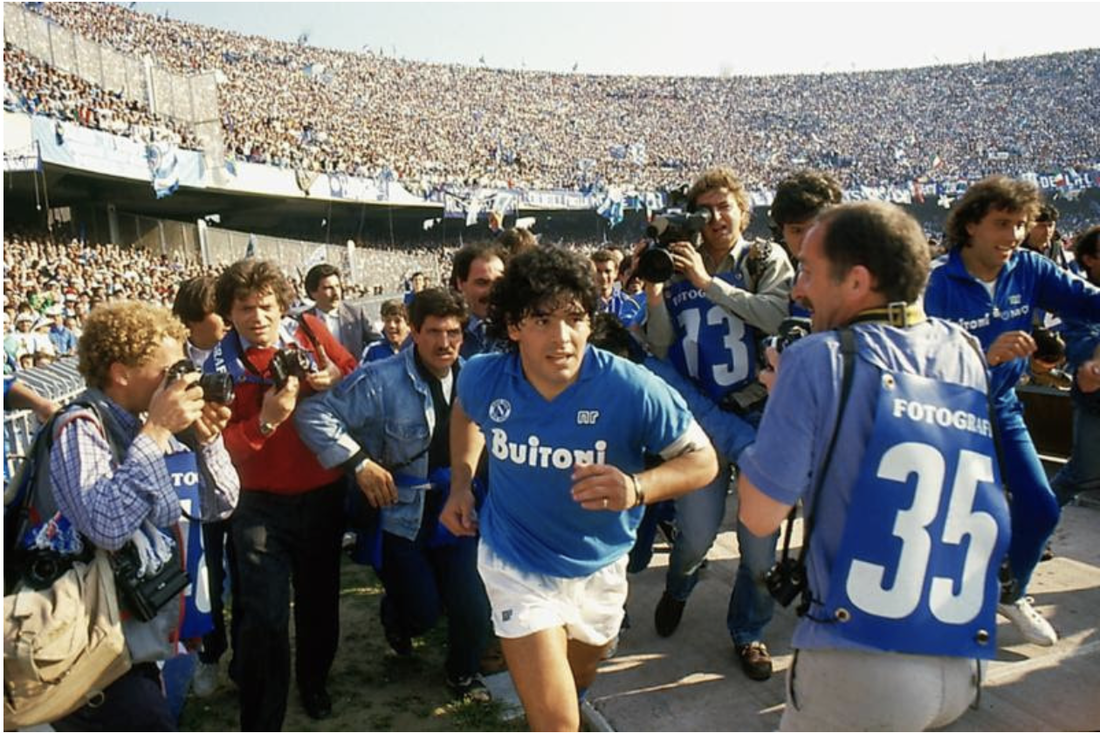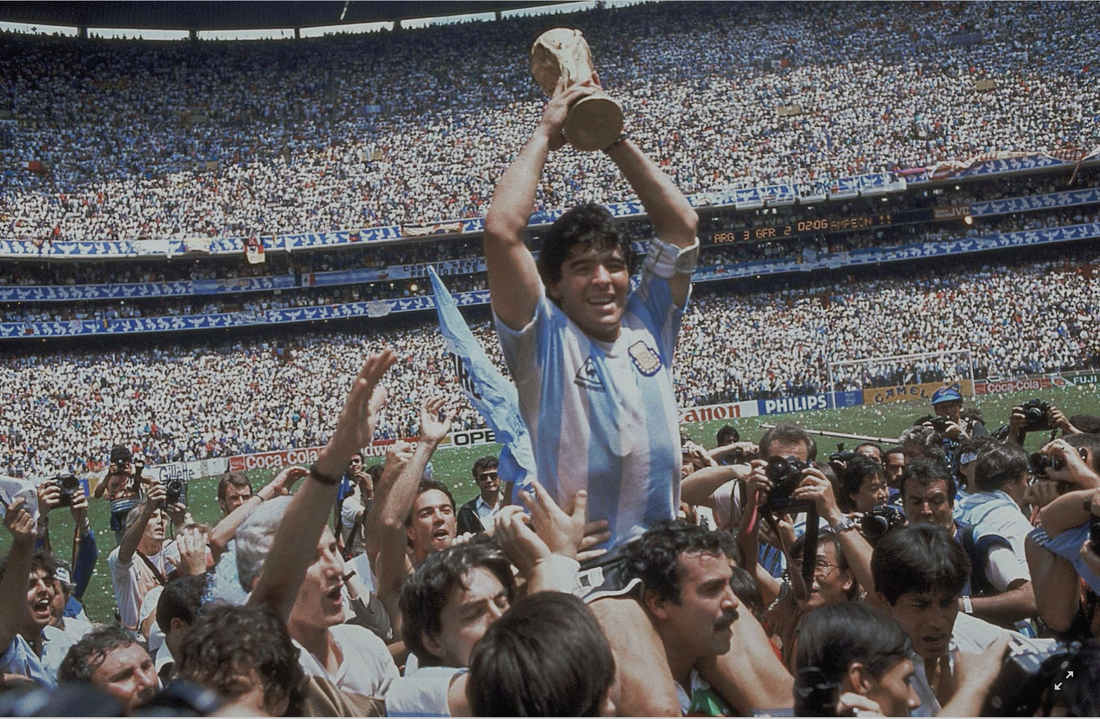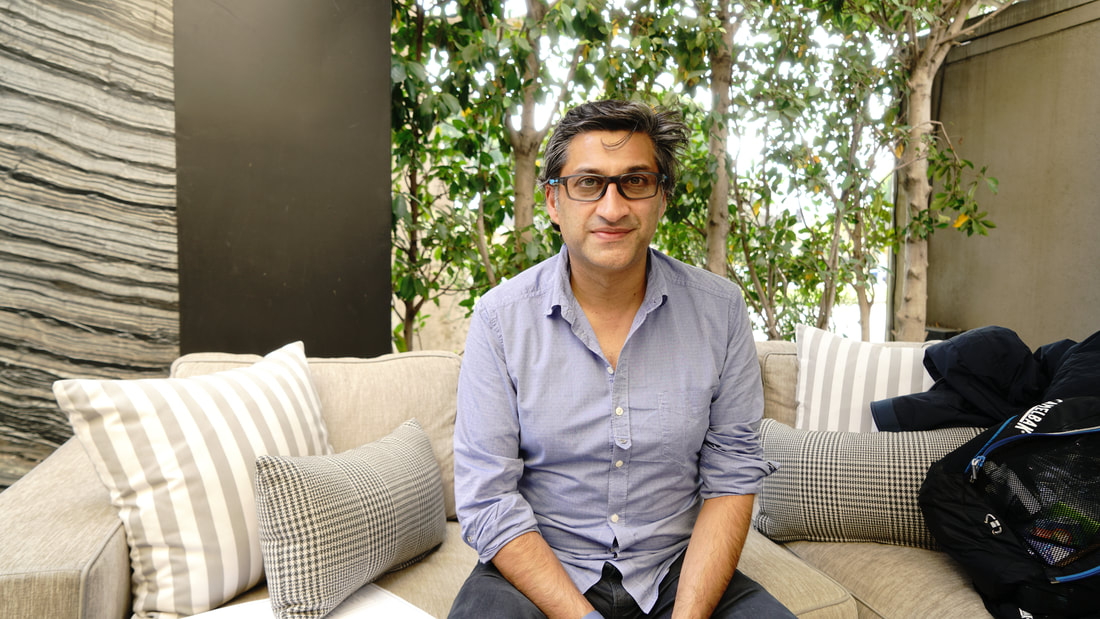|
Oscar winner conducted 10 hours of interviews with Maradona for his 2019 documentary
Director Asif Kapadia is reacting with shock to the death of Argentina football great Diego Maradona, the subject of the Oscar winner's 2019 eponymous documentary.
"Can't quite believe DM [Diego Maradona] is gone," Kapadia tweeted Wednesday after news broke that Maradona had died of a heart attack in Buenos Aires Province at the age of 60. Maradona underwent brain surgery only a few weeks ago. "Hard to process. He always seemed indestructible," Kapadia continued. "We did our best to show the world the man, the myth, the fighter he was. The greatest." The tweet included a photo of Kapadia with Maradona, who in his late 50s still appeared powerfully built, if struggling with his weight and other health issues.
Kapadia's documentary was based on multiple hours of interviews he conducted with Maradona, as well as 500 hours of footage of the star that had never been seen before. The film explores Maradona's origins in a rough neighborhood of Buenos Aires, his emergence as world class talent and leading Argentina to the World Cup title in 1986. It zeroes in on his time in Italy playing for the once-lowly club in Naples, which he lifted to championships. During his time in Napoli Maradona became entangled with the city's crime underworld and developed a ruinous drug habit, an addiction that would lead to his downfall as a player and eventual disgrace. "What an amazing character," Kapadia told me when I interviewed him for a piece about the film for the Documentary magazine website. "So much drama. It's like so much chaos." Sixty is young but 60 for Diego Maradona is a really long life.
In an interview with Britain's Channel 4 today, Kapadia characterized Maradona as soccer's GOAT.
"For me or a person of my generation he’s the best footballer ever because of what he did and how he did it," Kapadia observed. "But he’s famous also because of the way he existed and the way he lived." He added, "Sixty is young but 60 for Diego Maradona is a really long life and he’s lived a few lives. He had a full one, you know. There’s a lot of stories and there’s a lot of legacy and there's a lot of things that will come out. And I guess our film is a very small part of the kind of legacy of trying to understand the guy, understand the man and understand what he achieved, particularly in Italy which is the place that we ended up focusing on… He affected you. It’s very difficult to be indifferent to Diego Maradona. He’s emotionally going to affect you one way or another, and I think that’s what makes him special, that’s the legacy. You can’t see him play or you can’t see him do something or hear him do an interview and forget him."
Kapadia's film may have prompted a reevaluation of Maradona in the director's native Britain. Many Britons have nursed a grudge for decades after Maradona's Argentine squad ousted England in the quarterfinal of the 1986 World Cup by a score of 2-1. The contest was played in the wake of Britain's defeat of Argentina in the Falklands War a few years earlier.
Maradona scored both goals against England -- one by illegally using his hand to drive the ball into the goal; the referee apparently didn't missed the foul (Maradona at first denied touching the ball with his hand, but later attributed the goal to a divine act -- "the hand of God."). A few minutes after the hand ball Maradona scored the difference maker, weaving through the English defense in brilliant fashion in what is widely considered the greatest goal in World Cup history. In his Channel 4 interview, Kapadia defended Maradona over the controversial "Hand of God" goal. "The guy was the greatest. There's no denying it, right. He's a footballer. His job is to win football matches," Kapadia said. "And if you can win a football match against a team that humiliated you in a war four years earlier and do it by being the best player in the world and scoring essentially the greatest goal ever scored in the World Cup and scoring one with your hand and getting away with it -- and so that kind of very cheeky, Latin way of playing where if you can get someone sent off that's shows your cunning -- if you can score a goal against England with your hand and do it in such a way that nobody saw it... it's only in the replays that we all saw it... that kind of is a measure of who he was, two sides of the genius." Kapadia added, "It just shows the importance of him culturally and to Argentina and to everyone... The guy was a brilliant footballer. He was a great guy, he was a really interesting character. A lot of people are boring now. He lived to excess and he did things and he somehow got away with it for a long time and I think there's been a turning, a change in how people think of him." |
AuthorMatthew Carey is a documentary filmmaker and journalist. His work has appeared on Deadline.com, CNN, CNN.com, TheWrap.com, NBCNews.com and in Documentary magazine. |
- Home
- News
- Videos
-
Galleries
- 2019 Tribeca Film Festival
- Full Frame Documentary Film Festival
- 2019 SXSW Film Festival
- SXSW 2018 Gallery
- 2019 Sundance Film Festival
- Outfest 2018 Photo Gallery
- Outfest 2017
- Sundance 2018 Photos
- 2017 LA Film Festival
- 2017 Cannes Film Festival
- Tribeca Film Festival 2017
- SXSW 2017 Gallery
- 2017 Berlin Film Festival
- Sundance 2017 Gallery
- 2016 Los Angeles Film Festival
- Cannes Film Festival 2016
- SXSW 2016 Gallery
- Berlinale 2016 Gallery
- Sundance 2016 Gallery
- Filmmaker Gallery
- About
- Contact
Proudly powered by Weebly
- Home
- News
- Videos
-
Galleries
- 2019 Tribeca Film Festival
- Full Frame Documentary Film Festival
- 2019 SXSW Film Festival
- SXSW 2018 Gallery
- 2019 Sundance Film Festival
- Outfest 2018 Photo Gallery
- Outfest 2017
- Sundance 2018 Photos
- 2017 LA Film Festival
- 2017 Cannes Film Festival
- Tribeca Film Festival 2017
- SXSW 2017 Gallery
- 2017 Berlin Film Festival
- Sundance 2017 Gallery
- 2016 Los Angeles Film Festival
- Cannes Film Festival 2016
- SXSW 2016 Gallery
- Berlinale 2016 Gallery
- Sundance 2016 Gallery
- Filmmaker Gallery
- About
- Contact




 RSS Feed
RSS Feed